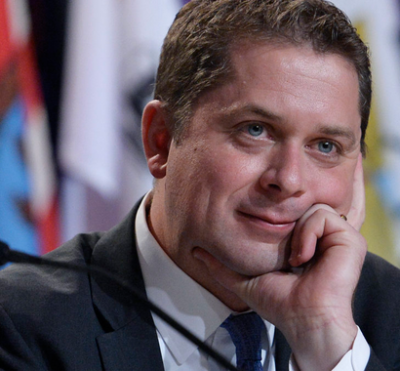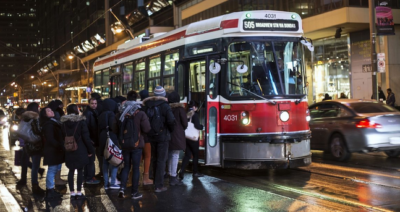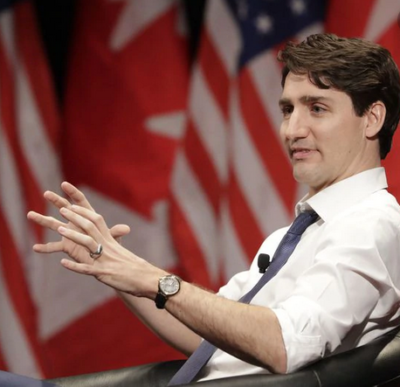September 17th, 2019
BURLINGTON, ON
Conservative leader Andrew Scheer is promising to slash the lowest of our five income tax brackets from 15% to 13.75%. That would add an estimated $6 billion a year to the annual deficit when fully implemented. Though the change is only at the lowest step rate, it will benefit not just the lower-income class but all the higher-income folks as well, given the progressive nature of our tax system.

Most people really didn’t know who Andrew Scheer is – in the next month they will get their chance to determine if he should be the next Prime Minister.
Mr. Scheer is essentially copying Mr. Trudeau, who cut taxes for the middle class, the second lowest step by 1.5% shortly after becoming PM. Those with lower-incomes spend virtually all of their money, and that new spending helped the country avoid the impending 2015 recession Mr. Harper’s Tories was facilitating with his austerity program.
Except that, unlike Scheer’s plan, Trudeau also raised the marginal tax rate on those earning over $200,000, to 33%, thereby attempting and almost succeeding to achieve revenue neutrality. One needs to ask why Mr. Scheer wouldn’t apply the same formula to his plan, add another step for those earning, say over a million big ones, hitting them with a marginal rate of 40 or even 50 percent – or whatever would allow his tax cut to become revenue neutral?
![]() Canada had 1.3 million millionaires in 2018 and that’s expected to rise to nearly two million people by 2023. Instead, Scheer’s promised new tax cut is just paying taxpayers with their own money, leaving an annual $6 billion of debt as an unwelcome inheritance for their children.
Canada had 1.3 million millionaires in 2018 and that’s expected to rise to nearly two million people by 2023. Instead, Scheer’s promised new tax cut is just paying taxpayers with their own money, leaving an annual $6 billion of debt as an unwelcome inheritance for their children.
And how wise is it to slash taxes when Canada’s economy is booming with record low unemployment and solid economic growth? Timing is important. There is a danger that new consumer spending might just overheat the economy, raising the risk of inflation and lead to higher interest rates. Is this really the most prudent fiscal policy for today’s economy or just another populist vote-getter?
![]() And for those with the lowest incomes, it amounts to a little over a dollar a day by Mr. Scheer’s own calculations. If Scheer’s goal is to help lower-income Canadians, it would have been more effective to cut the regressive HST by one percentage point, or expand a program like national pharmacare which would reduce the burden of health-related costs for most ordinary Canadians.
And for those with the lowest incomes, it amounts to a little over a dollar a day by Mr. Scheer’s own calculations. If Scheer’s goal is to help lower-income Canadians, it would have been more effective to cut the regressive HST by one percentage point, or expand a program like national pharmacare which would reduce the burden of health-related costs for most ordinary Canadians.
dividual tax returnWhen Mr. Harper followed through on a campaign promise to reduce the goods and services tax rate from seven to five percent, the net effect was roughly the same $6 billion in lost revenue as Mr. Scheer’s income tax cutting proposal. But this was not only very popular, but also sound progressive social policy, as it left more loose change in the pockets of those who needed it most.
Scheer is determined to eliminate at least one sales tax, the carbon tax. Unfortunately that would hurt more than help lower-income Canadians, since the annual rebate exceeds what most Canadians pay in carbon taxes. Of course Scheer doesn’t ever mention the carbon rebate, which is nothing short of intellectual dishonesty – a lie by omission is still a lie.
And there is a certain irony in another dishonesty when he attacks Trudeau’s original income tax cuts, the ones he is only partially emulating. Specifically he is using figures from a flawed analysis by the partisan Fraser Institute to argue that middle-income earners are now paying $800 a year more.
In their analysis the Fraser institute netted out other changes to the tax system, such as the transit credit, which was eliminated by the Liberals, but completely ignored the Canada Child Benefit which was responsible for lifting almost 900,000 people out of poverty since 2015. Correcting that deficiency showed that there was now over $2000 more in people’s pockets – not bad for a ‘tax-and-spend Liberal’.
And Scheer is promising to bring back those Harper-era tax credits for using public transit – a 15 per cent credit on weekly and monthly transit passes. That would cost over $200 million a year according to the Parliamentary Budget Office. Analysis of this feature had concluded that this was a very costly measure with most of the benefits going to those who could best afford it anyway.
Still, for a government which has made climate action a priority, encouraging transit ridership, however that is accomplished, is a good idea. Kudos to Mr. Scheer for resurfacing this policy. Changing our behaviour and reliance on the automobile is a problem, not only for traffic congestion, but also related to climate change. And by the way, a tax credit to encourage public transit makes a perfect companion to a today’s electric vehicle rebates and the carbon tax.
It is a hard sell for an opposition party going up against a government that has managed the economy as well as the Trudeau government has over the last four years. So Scheer and the other parties are either going ballistic, like the Greens wanting to kill the TMX pipeline, or becoming desperate and committing to problematic policies, like Scheer’s income tax cuts.
Many voters have been cultured to believe that the biggest job for any government is to wrestle the annual deficit down to zero. Mr. Trudeau had promised to eliminate it over the course of his first term. And Andrew Scheer had also promised to do so within his first two years. But now all bets are off and none of the major leaders are promising to eliminate the deficit over the next next four year electoral term. That is, unless Maxime Bernier is brought into the discussion from the far right-field of dreams.
And there are no alarm bells ringing, at least not like like the ones Ontario premier Ford rang when he ousted the provincial Liberals by exaggerating the size of the provincial deficit by a factor of two. In fact, the real numbers were relatively closer to former Wynne’s final accounts, and even the Auditor General apparently got it wrong. How does $15 billion really become only a little over seven billion dollars?
Today’s important economic health metric is the debt to GDP ratio. So long as it is declining, the economic levers are moving in the right direction. After all, we owe the vast majority of our public debt only to ourselves, and even the servicing costs just come back to us in interest payments, which are again taxed back to an extent. What is most important is how well we grow the economic pie so that we all get a larger share, are better off and minimize unemployment. Oh, and did I mention the environment and our climate?
The NDP, which promised in the last election that it would religiously balance its budgets, has now decided to be guided by the new metrics, as are the Liberals. And the Green Party is still talking about eventually eliminating the deficit but nobody has seriously talked about the debt since the Chretien and Martin governments were defeated back in 2006.
And of course the deficit can always be reduced or eliminated by increasing taxation, as the Greens or the NDP would do while making the rich pay their fair share, however one defines that. But not by cutting taxes for everyone, including the wealthiest Canadians as Mr. Sheers 1.25% income tax cut would end up doing.
 Ray Rivers writes regularly on both federal and provincial politics, applying his more than 25 years as a federal bureaucrat to his thinking. Rivers was once a candidate for provincial office in Burlington. He was the founder of the Burlington citizen committee on sustainability at a time when climate warming was a hotly debated subject. Ray has a post graduate degree in economics that he earned at the University of Ottawa. Tweet @rayzrivers
Ray Rivers writes regularly on both federal and provincial politics, applying his more than 25 years as a federal bureaucrat to his thinking. Rivers was once a candidate for provincial office in Burlington. He was the founder of the Burlington citizen committee on sustainability at a time when climate warming was a hotly debated subject. Ray has a post graduate degree in economics that he earned at the University of Ottawa. Tweet @rayzrivers
Background links:
Scheer’s Tax Cut – Middle Class Tax Cut – Ontario Deficit – Transit Tax Credit –


















Even if one accepts your supposition Ray that the number of millionaires in Canada is 1.3 million (the Hufiington Post actually pegs the number at between 367,000 and 500,000) to attribute this increase directly to the economic policies of the Trudeau government strains credulity. I would submit that the reason for so many millionaires is a direct consequence of: 1) immigration by high income earners from places such as Hong Kong; 2) generational wealth transfer from grandparents to children and grandchildren; 3) residents in places such as Toronto and Vancouver cashing out and selling large homes and then moving to other locales; and 4) an influx of white collar criminals laundering the proceeds of crime which, in B.C. alone, is pegged at $28 billion according to the RCMP.
If the Trudeau Liberals want to run on their stellar economic record, then fine. Let’s also look at the following: 1) productivity in this country is declining; 2) the average Canadian carries $1.70 worth of debt for every dollar of equity; 3) the federal deficit is now $20 billion when in 2015 the PM told us he would balance the budget; 4) a recent study study showed the average Canadian is only one paycheque away from disaster, which even the PM admitted the other day in a campaign speech.
Why is the major theme in this election focused on affordability? Answer: because the federal Liberals have done such a pathetic job of managing the country’s economy. For all the giveaways and funding for special interests the average household in this country is falling farther and farther behind. Trudeau and his Finance Minister haven’t a clue how to right the ship of state, and chances are another four years at the helm won’t improve things any. Time for a new captain and first mate!
Everything you are saying Scheer could be doing, but isn’t, are things that current party in power could have done in the last 4 years with its majority, if they are such good idea as you suggest.
The photo caption reads: “Most people really didn’t know who Andrew Scheer is…”. From what I can find, he has a B.A. in History and has never held a serious job besides being elected MP at age 25; it’s debatable whether or not MP should be considered a serious job. That doesn’t seem like much of a resume for someone who aspires to leading the country’s government.
Also speaker of the House of Commons. But, if we can elect a part-time drama teacher and snowboard instructor as PM—how did that work out?
Why don’t we ask Mike Duffy 🙂 ?
Given the overnight revelations of the PM’s performance in black-face and Arabian Nights attire maybe we should add “children’s entertainer” to his list of occupations.
On second thought…maybe not. That would be vulgar, discriminatory and in poor taste, and the last thing we’d want to do is have a national leader lacking in decorum and respect setting a bad example for our kids. All the more reason why the Liberal Party rank-and-file should finally grow some guts and dispatch this guy to the sidelines.
Just reread your essay. You got it wrong in the first sentence. The tax rate on the first tax bracket is cut for everyone (universal cut).
Ray, you need to clarify your data. You indicate that there were 1.3 millionaires in Canada in 2018–does this mean they were earning $1 million + per year? This is what your Liberal analysis is implying but I doubt it’s true! If you mean that their net worth was $1 million +, that’s a different story because Canadians are not taxed on their net worth (of course, that may change given the voracious appetite for tax revenue by the party you support)—if you own a single-family dwelling in Burlington that is mortgage free and for many older Burlingtonians that is likely, they are all millionaires on paper. Their income on which they are currently taxed, and excessively so (keep in mind that the average Canadian now pays more in taxes per year than they do on food, shelter, and clothing!) will likely be much lower.